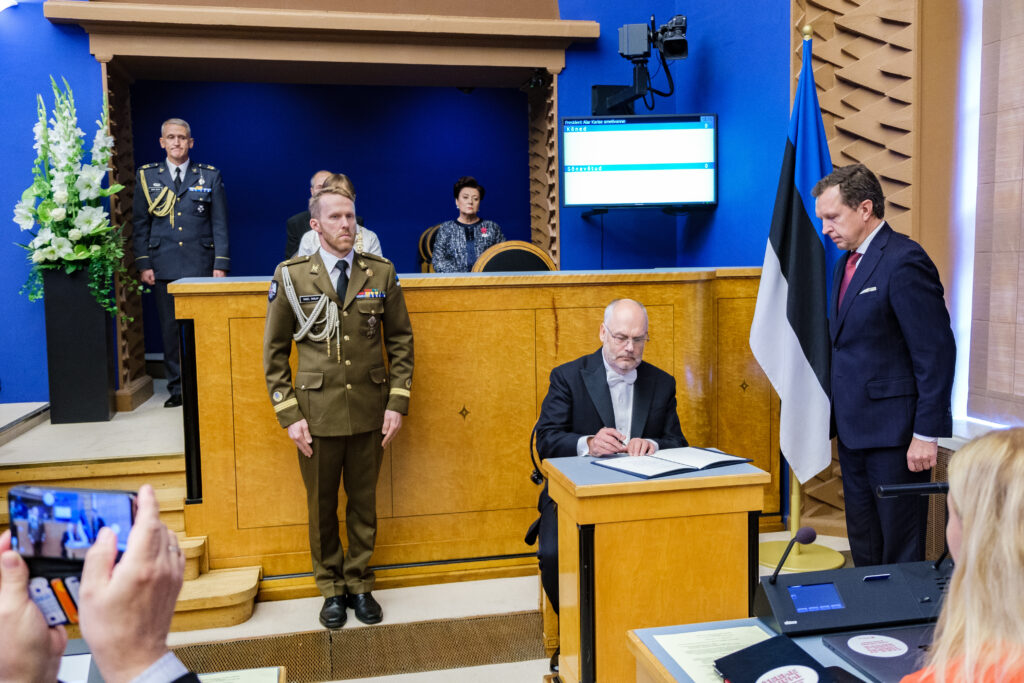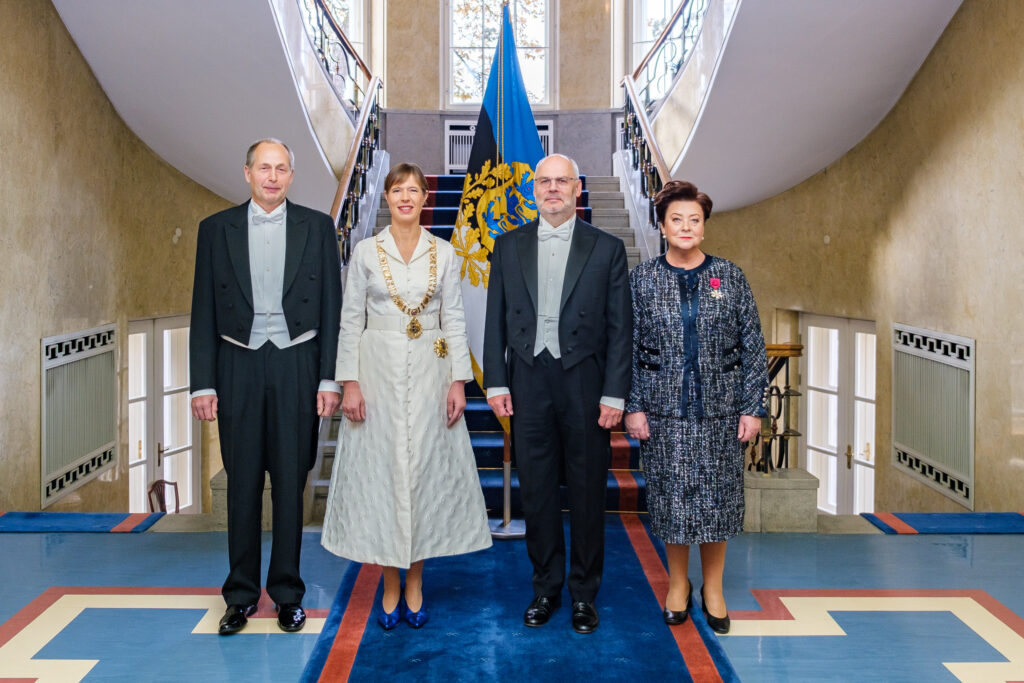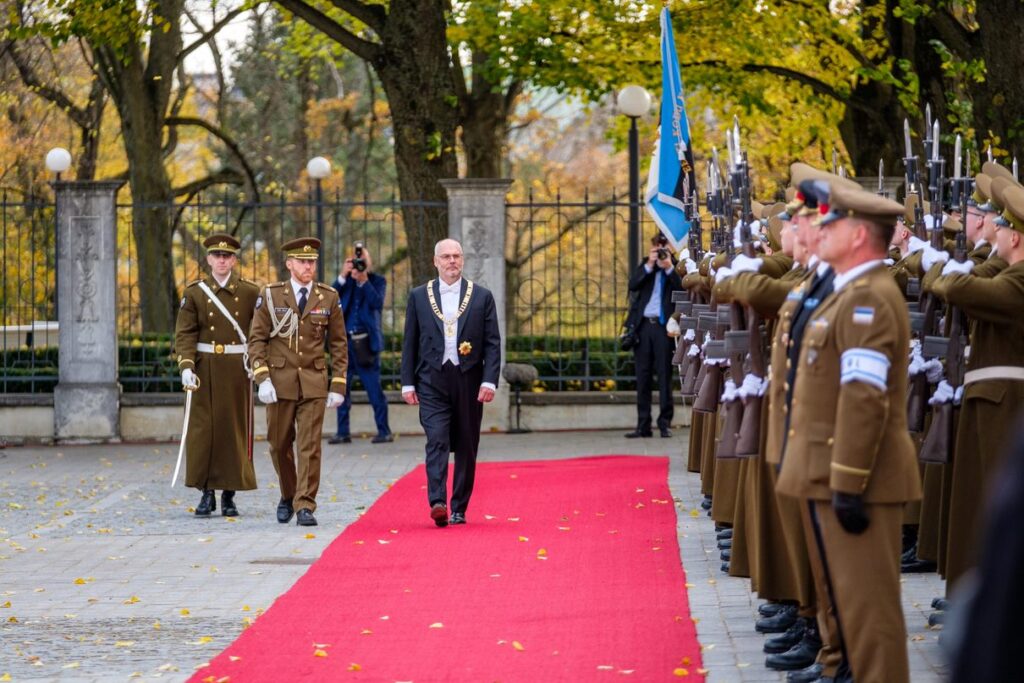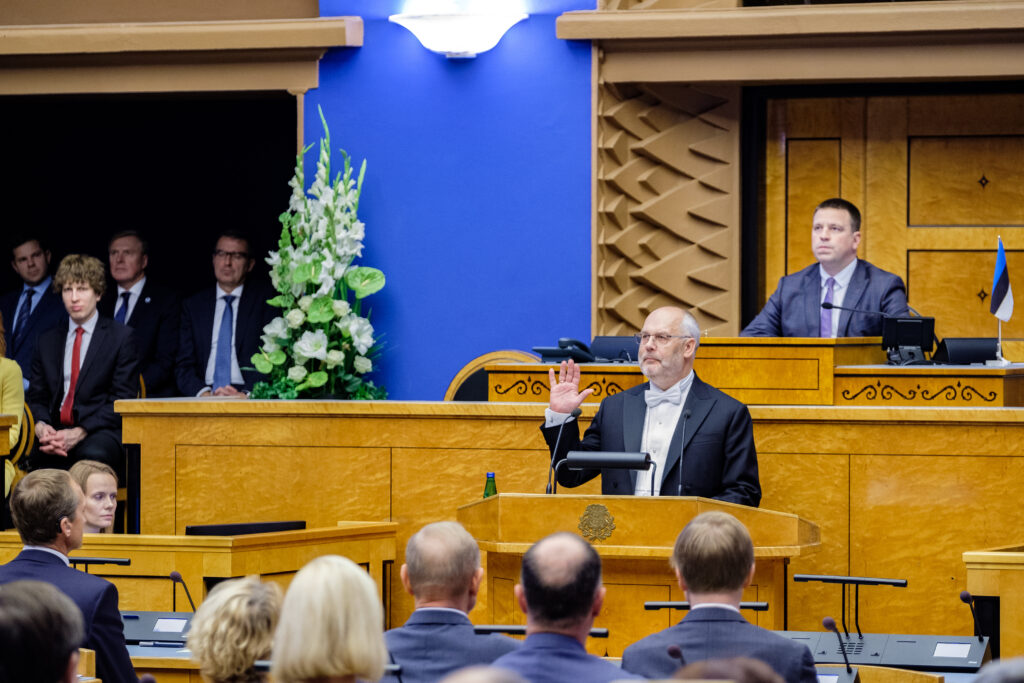The new Estonian president, Alar Karis, who assumed office on 11 October, emphasised at his inauguration ceremony the freedom of speech and parliamentary debate, national culture, education and intelligence, climate change and international cooperation; Estonian World publishes Karis’ speech in a lightly edited and shortened form.
One hundred years ago, extensive construction was underway here. At a time when the Estonian state was just learning to walk, this assembly hall, which was unusually modern and optimistic for the era, was erected under the guidance of two friends and architects, Herbert Johanson and Eugen Habermann. The Riigikogu, which is likely the world’s only Expressionist and impassioned parliament building, was meant to give extraordinary momentum to legislators’ ideas and decisive consequence to their statements.
You yourselves are doubtless aware that every word spoken in this hall should be an act, functional and pertinent.
Yet, it would be belittling to say that parliament is merely an assembly of speakers, for it is also one of consensuses and compromises, and of oppositions. At the same time, one should be concerned when legislators do not hear or listen to one another, when doors are slammed, when words turn to noise, when votes lack substance, and the natural framework of politics is thereby torn. When this happens, the words spoken here are meaningless, excessive, or meant simply to provoke, amass, and bury what truly matters. That is when people start to think that politics is devoid of substance and meaning.
No topic is taboo
Words are imperative tools in my work as well. As is the ability to patiently listen and attentively take note.
Those early decades of the last century, in which Estonians’ parliament was built at a remarkable speed, also delivered principles that have been enshrined in the preamble of every Estonian constitution, regardless of our political twists and turns.
It states that the country we share is:
founded on liberty, justice, and law,
which is for the defence of internal and external peace, and is a pledge to present and future generations for their social progress and general welfare.
Those words are the genetic code of the Estonian state.
“For the defence of internal and external peace” is an instruction, a task, and remembering it must be a daily duty for each and every one of us. All else comes only later – even the preservation of the Estonian nation and culture through the ages.
Internal peace is not the consolidation, disparagement, or trampling of differing beliefs. Rudeness and insults are reprehensible, and I will not refrain from reiterating it.
What I do hope to see more of, however, are debates and discussions in the Riigikogu and Estonian society; the defence of one’s own standpoints and hearing out of others’. No matter whether the topic is the climate and green transition, energy and tax policies, the budget and forestry, or the European Union’s choices and the development of our military. No topic is taboo. Dogmas and bureaucratic political correctness fetter the freedom of thought, without which we cannot achieve solutions that will lead us forward.

Culture is a question of a nation’s life or death
Composers, actors, artists, and writers often demonstrate bold thinking that we also need to have when conducting state affairs. Estonia’s culture is our defence against darkness; it is our national identity. To borrow from the author Viivi Luik: culture is not an ornament or a pastime, culture is a link to our fellow people, a bridge spanning the abyss of diverging opinions. Culture binds our nation together, as singular and multifaceted as it is. Even this turbid and turbulent time is ultimately put into words by a writer, depicted by an artist, given melody by a composer.
Here, a simple suggestion: let us read, listen to, and take in Estonian culture. It will broaden our horizons.
We should remember the sceptical looks we received when the Tiger Leap project was proposed a quarter of a century ago, setting up computer labs in Estonian schools and putting schools themselves on the internet. Or, for example, the decision to implement Estonian ID cards. There were those who doubted, arguing that the project was costly, and why should we need plastic cards with our photo on them?
These two examples – Tiger Leap and the Estonian ID card – demonstrate the benefit and charm of thinking and acting “outside of the box”.
We hope for technology to erase distances and alleviate pains, but unfortunately this still doesn’t hold true for everyone. We’ve yet to cross the final mile and put e-governance to maximal use. Estonia is proud of the success of our IT companies, but it’s sometimes apparent that the e-state is akin to a quilt that, in crises, tends to tear at the seams between agencies, and sometimes even between the state and private sectors. Let’s be honest with ourselves: not everyone can currently say that their everyday relationship with the state is based in digital solutions. Issues of security and sustainability are additionally at hand, and we cannot expect to avoid being grazed by cyber dangers.
Intelligence is a collective achievement
As a prelude before assuming office, I emphasised that an intelligent nation is one of my ideals. I also specified that the measure of intelligence and scholarship is not the number of degrees issued, but the ability to utilise knowledge and get by; to cope with any situation. It’s what’s known as learning ability.
Let me digress. Russian-language kindergartens provide free Estonian lessons, but parents may also pay for their children to have more. These lessons are only enjoyed by children whose parents have the resources. Not all do. Thus, financial inequality starts to develop already at the kindergarten level. It is the first obstacle for the children of Russian-speaking families and impacts how they will manage later in life, decreasing their competitiveness on the labour market and diminishing their conviction that they truly are an equal part of our society. Still, how easy it would be to lower that obstacle.
An intelligent nation can separate the wheat from the chaff; it understands the motivating power of facts, first and foremost. However, in our communication-saturated society, even the most fallacious claims can garner support and admiration. People form camps in the shadowy corners of social media, and their doubts expel reason from the mind almost effortlessly. Intelligence is rendered mute, and submissive silence can lead us into trouble.
Intelligence is a collective achievement. Estonia’s constitutional order must ensure that it is not decision-maker’s personal beliefs that are reflected in state decisions, but a wager of what society as a whole is capable. Power tends to boost self-assurance, but none of us are as wise as the nation collectively. The idea of constitutional order propels us to become increasingly intelligent as a society.
An intelligent nation does not let hope be lost. It does not toe the line. It observes and experiments, is confident and unafraid to make mistakes. An intelligent nation thinks in limitless perspective and does not fear encountering the unknown, be it the pandemic or global climate crisis. An intelligent nation empathises with their neighbour and has compassion.

Estonia’s success story has not reached everyone in the country
This also concerns our attitude towards those whose everyday well-being is strained. I remain of the mindset that Estonia’s success story has not reached everyone in the country. And I wish, somewhat idealistically, for none of our fellow citizens to feel abandoned or unwanted. No matter if the cause is mental health problems among youth, the tragic depths of which we sometimes realise only once it’s too late, or price increases that we can see on our electric bills and only amplify financial hardship for many families.
How can we find peace of mind when our struggle with the pandemic has turned out to be an exhausting 50-kilometre (31 miles – editor) trek instead of the sprint for which we’d hoped? When there’s rising sentiment that evidence-based medicine is advancing at a timid crawl in the crisis, and the decisions that affect people’s everyday lives seem like arbitrary spasms? For the justification of those decisions has been ineffectual.
Morale fades where fear and fatigue start to spread. Most people who wish to vaccinate against COVID-19 have already done so or intend to very soon. But not everyone wants to get vaccinated, and thereby risks contracting a severe case of the virus or infecting others. And in the end, we find our country in lockdown.
I have practiced science and have faith in it, as well as in the science-based approach that surrounds us. If someone who has so far refused to get vaccinated and is unsure were to ask for my advice, then I’d naturally advise them to reconsider and allow themselves and their loved ones to receive the vaccine.
In the coming days, I will meet with the scientific advisory board that has been counselling the government, as well as with the ministers for health and labour, to get the broadest picture I can of how far we’ve come on our long encounter with the unknown, as well as what might be the best solutions for our future. In these meetings, I will be a constructive, and a demanding, partner.
The president plays a balancing role
The backbone of Estonia’s parliament, or rather the trunk of our domestic politics more broadly, is shaped by the political parties that assemble the Riigikogu through elections. This democratic party-based system is a tremendous asset that gives many citizens the opportunity to participate in local or state government. I wish to meet with the heads of Estonia’s political parties soon. The system is a facet of a free society, though I do not pick sides among our parties. Only in this way can I fulfil the oath of office I just took: to exercise the power entrusted to me in a just and impartial manner.
During the turmoil that surrounded the presidential selection process, it was said that the search was for a candidate for the whole nation. It is a goal towards which to aspire, even if it seems that goal may never be fully grasped. Still, let us keep in mind that in our country, the president plays a balancing role.
It’s not at all pointless to debate the most sensible path to selecting the president in modern-day Estonia. Though it had nothing to do with the candidates, the last two processes caused a great deal of public perplexity and disappointment.
Nevertheless, we must not design a process that places so many expectations on the president that it should become necessary to start distorting or even violating the constitution. Should there be direct elections? Should the process be entrusted to the electoral college, thus boosting local governments’ representation? Or should the submission of candidates be moved to an earlier date and everything else left as is?
The choice is yours, honourable Riigikogu. My task is to ascertain the parliament’s political intention and, if necessary, submit to you a proposal for amending the constitution. This will also play a part in expanding internal peace in our society.

The climate and ecosystems becoming a part of everything we do
Looking far ahead and adjusting to inevitable, imminent changes is likewise a mark of intelligence.
It would be convenient but merely self-deception to think that this summer’s near-record high temperatures were a one-time occurrence. The same applies to the downpours that flooded Tartu and the storm that threw Võru into darkness two years ago. It isn’t unique to Estonia – the climate is showing erratic tendencies in every corner of the globe and with rising frequency. Our ability to perceive and understand it, to be prepared – as states, communities, and individuals – has been inconsistent.
We can, and we must, discuss crisis preparedness more narrowly. However, the bigger picture is that we’ve entered an irreversible era in which consideration for the climate and ecosystems is becoming a part of everything we do, from agriculture to education and urban planning. The clause in our constitution that stipulates everyone has a duty to preserve the living and natural environment has grown greater than Estonia’s own forests, lakes, and soil. It is a matter of our entire planet’s survival.
In the globalised world, dried-up wells in Jakarta and Jõgeva County are within equal reach, even though we may not perceive it that way. Just as how smoke from forest fires and invasive species honour no national boundaries, our borders may be unable to hold back surges of immigrants displaced by storms or famine.
Unified Europe and ironclad trans-Atlantic cooperation
We are seeing a world where dissent is not always conspicuous, but heated opposition may be brazened and imperious; where democratic states number fewer than authoritarian regimes; where the sparring of world powers has shifted from Europe to the Pacific Ocean; and where Europe itself sometimes argues over what direction to take.
This does not cause the course of Estonia’s foreign affairs or our policy compass to waver or stall. We know what we need: a strong, unified Europe and ironclad trans-Atlantic cooperation.
Relations and channels of communication with all our closest and more distant neighbours are critical to Estonia. And I stress the word all, for with some neighbours we discuss coordinated activity in the European Union, and with others it may be joint defence plans, our own successful reforms that strengthen the state based on the rule of law, common efforts to protect the environment of Lake Peipus, cultural cooperation, or the modernisation of transport corridors. All these discussions are important and require communication, for it is a component – recalling the preamble of our constitution – of Estonia’s external peace.
Today’s war is not sparked by artillery fire. Hybrid conflicts, aggression in cyberspace, and the intentional creation of societal rifts are the new battlegrounds and frontlines. Therefore, alongside armaments, Estonia’s fate can be determined by its positive reputation in the world, our social cohesiveness, and trust between people and the state. Today, national defence begins with guaranteeing social viability; with knowing that everyone is prepared to do their part.
The constitution compels me to assume the authority of supreme commander of the national defence of Estonia starting from this day. I am confident that we have chosen the right path in developing our defences. I know that the Defence Forces’ brigades do not merely exist on paper, and that the well-trained and effectively armed men and women in their ranks are capable of appropriate action. The Defence Forces’ modernised warehouses are stocked with the necessary equipment. A strong and voluntary desire to protect our nation gives the Estonian Defence League tenacity. It also bolsters the reservists who gather for drills and the teachers who regard the need to serve one’s conscription as self-evident.
In difficult situations, Estonia does not have to seek solutions all on its own – allies stand steadfast by our side. Close ties must be fostered with each of our allies; they are not formed or maintained automatically.
The Defence Forces play a strong role in educating our youth. For an entire generation, they have provided enlistees with fortitude, a sense of duty, and, for many young persons, proficiency in the Estonian language. Not to mention inner radiance. With such an attitude, we can look in dignity upon all those who came before us, who fell on the battlefield, who endured extreme scarcity, or who were made to endure terror and humiliation. They were deprived of vital symbols that for decades persisted only in dreams and outside of Estonia.
As president, I intend to be a balancer above all, and if necessary, a mediator. Hopefully you already understand that coming from the field of science, I will continue to tune my thoughts and mind to a knowledge-based key.
This is not only my freedom, but my duty.
Alar Karis was elected the next president of Estonia on 31 August 2021.
The opinions in this article are those of Alar Karis. Cover: Alar Karis at his inauguration ceremony in the Estonian parliament, Riigikogu.


Dear Estonia,
Love your country and your culture. Don’t listen to globalists who tell you that you need diversity. You don’t. You’re perfect as you are. Diversity has brought dissention and resentment to my country.
Preserve your culture and heritage at all cost!